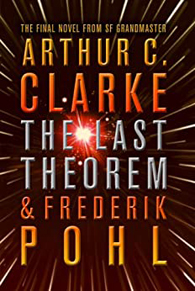 The Last Theorem, by Arthur C. Clarke and Frederik Pohl
The Last Theorem, by Arthur C. Clarke and Frederik Pohl
I picked this one up cautiously in a secondhand shop: cautiously, because it’s from 2008 and I’ve found most of Clarke’s later-career collaborations, and indeed solo projects, are to be approached with caution. Still, as collaborations go this one has a pretty good pedigree. They collaborated by email and it got published posthumously for Clarke, just about prehumously for Pohl.
But The City & the Stars or Gateway it ain’t, though it has its strengths. From Clarke, we get an obviously deep love for Sri Lanka: its peoples, its character, its land. From Pohl we get a good dose of number theory. I now know how to count to 1023 on my fingers, and how to tell at a glance the exact number of possible heads/tails combinations in a line of coins of any length you choose, even if I can’t see the entire line or know how many coins there are in it.
And thus we get the amiable tale of an amiable bisexual Sri Lankan mathematics genius (he proves Fermat’s last theorem), who as well as various escapades like being kidnapped by Somalian pirates becomes peripherally involved in setting up an orbital skyhook and in saving the Earth from aliens who want to sterilise us as a possible threat to Galactic harmony. That peripherality is the biggest problem. Fermat’s last theorem is the only thing he really solves; everything else gets worked out by other people. Even what should be the biggest problem faced by anyone, the threatened xenocide by the aliens, is solved by the aliens themselves deciding humans aren’t that bad. Ranjit has a Candide-like ability to just absorb any experiences thrown at him, even capture and torture by said pirates, and frequent references are made by the omniscient narrators to his long life, so there is zero sense of threat and menace. And having gone into real-world conundra like number theory in such loving detail, the much iffier notion of uploading a deceased person’s personality so that, you know, they’re not really deceased (yeah, right) is glossed over in a couple of pages, so Ranjit has no real reason even to mourn his wife who dies in a tragic scuba accident.
It’s not a bad final novel; certainly it picks up from some of the stuff Clarke was turning out at the end. It’s just a thunderingly inconsequential one. The Fountains of Paradise, published a full 30 years earlier, would have made a much better career capstone. And it’s got Sri Lanka in it, too.
